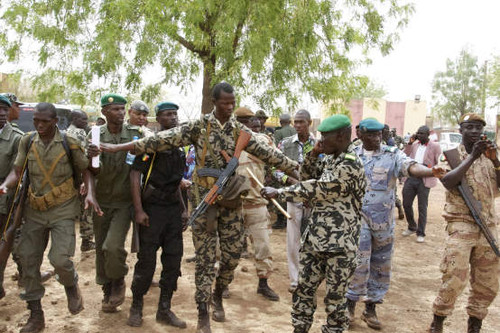Mali
Publicado26 Mar 2012

Coup Leaders in Mali Struggle to Assert Their Control
DAKAR, Senegal — Residents of Bamako, the capital of Mali, waited in tension and uncertainty on Saturday for the outcome of a military coup d’état that overthrew the country’s elected government last week, ending more than 20 years of democracy in the nation.
Regional analysts and residents said little appeared to be resolved as junta leaders struggled to maintain control amid increasing international isolation and persistent rumors of an imminent countercoup. State television, seized early on by the coup leaders, went off the air for an hour on Friday night as soldiers set up barricades around the downtown building housing it.
Later, Capt. Amadou Haya Sanogo, the coup leader who had received military training in the United States, appeared briefly to assure viewers of his “good health,” followed by repeated declarations of support for the junta from young people and other backers, many using the same language. Speaking of the countercoup rumors, a military spokesman, Col. Idrissa Traore, said Saturday that there was “nothing serious in all that.”r on Friday night as soldiers set up barricades around the downtown building housing it.
Continuar a ler no New York Times.
Mali coup leader denies looting by his soldiers
Bamako, Mali (CNN) -- Mali's junta leader Capt. Amadou Sanogo decried looting of offices and shops in the capital, Bamako, but deflected blame from his renegade soldiers who staged a coup just weeks before scheduled elections. Sanogo blamed "ill-intentioned" people who were against the military takeover in Mali, once hailed as a shining example of African democracy.
Vandals ransacked Bamako, after food, fuel and basic commodities became scarce. "I deplore the acts of vandalism and pillaging which have occurred," Sanogo said on state television late Friday, urging Malians to stop the vandalism.
"This is not our mission, this is not our cause, this is not our objective," he said.
Continuar a ler na CNN.
Naufragés du putsch aux frontières du Mali
L'une des premières mesures prises par les putschistes à Bamako, une fois le coup d'état de jeudi certifié par leur déclaration à la télévision nationale (ORTM), a été de déclarer la fermeture des frontières. Ce n'est pas très original.
Mais d'un point de vue putschiste, cela se justifie. Dans le flottement qui suit la prise du pouvoir, mieux vaut boucler le pays. Enfin, c'est ainsi que cela se passait lors des grands vagues de coups militaires en Afrique, dans les années 1970, par exemple.
On pensait ce temps révolu. Ou modernisé d'une façon légère et subtile. Le coup d'état pour la démocratie....La dernière fois, au Niger, comme nous le racontait à Niamey, il y a quelques jours, un leader touareg de l'ex-rébellion "les soldats ont pris le palais à l'heure du déjeuner, et pour le dîner on avait déjà un nouveau gouvernement". Le président qui venait d'être renversé, Mamadou Tandja, avait tordu la constitution pour rester au pouvoir envers et contre tout, nul ne pleura sa chute. Les putschistes, plus tard, remirent le pouvoir au civil. Et on oublia ce petit détour en terre d'illégalité.
Continuar a ler no Le Monde.
